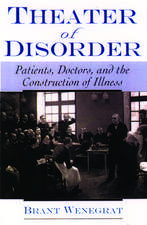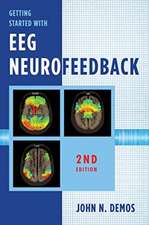Adding Neurotherapy to Your Practice: Clinician’s Guide to the ClinicalQ, Neurofeedback, and Braindriving
Autor Paul G. Swingleen Limba Engleză Hardback – 14 apr 2015
Included in the coverage:
- Treating the condition instead of the diagnosis.
- Case examples illustrating how to conduct the ClinicalQ, interpret results, and convey them to clients.
- Sample protocols of braindriving and neurofeedback.
- Using therapeutic harmonics to advance neurotherapy.
- Age-appropriate neurotherapy for children and seniors.
- Brainwave diagrams, data tables, client forms, and other helpful tools and visuals.
| Toate formatele și edițiile | Preț | Express |
|---|---|---|
| Paperback (1) | 458.23 lei 6-8 săpt. | |
| Springer International Publishing – 6 oct 2016 | 458.23 lei 6-8 săpt. | |
| Hardback (1) | 582.32 lei 3-5 săpt. | +21.90 lei 7-11 zile |
| Springer International Publishing – 14 apr 2015 | 582.32 lei 3-5 săpt. | +21.90 lei 7-11 zile |
Preț: 582.32 lei
Preț vechi: 612.97 lei
-5% Nou
Puncte Express: 873
Preț estimativ în valută:
111.44€ • 121.01$ • 93.61£
111.44€ • 121.01$ • 93.61£
Carte disponibilă
Livrare economică 01-15 aprilie
Livrare express 18-22 martie pentru 31.89 lei
Preluare comenzi: 021 569.72.76
Specificații
ISBN-13: 9783319155265
ISBN-10: 3319155261
Pagini: 245
Ilustrații: IX, 191 p. 48 illus., 32 illus. in color.
Dimensiuni: 155 x 235 x 20 mm
Greutate: 0.46 kg
Ediția:2015
Editura: Springer International Publishing
Colecția Springer
Locul publicării:Cham, Switzerland
ISBN-10: 3319155261
Pagini: 245
Ilustrații: IX, 191 p. 48 illus., 32 illus. in color.
Dimensiuni: 155 x 235 x 20 mm
Greutate: 0.46 kg
Ediția:2015
Editura: Springer International Publishing
Colecția Springer
Locul publicării:Cham, Switzerland
Public țintă
Professional/practitionerCuprins
Overview.- Introduction.- The ClinicalQ.- Treat the Condition not the Label.- Neurofeedback.- Potentiating Neurotherapy.- Braindriving.- Peripheral Biofeedback.
Recenzii
“Adding Neurotherapy to Your Practice delivers whatthe author promised in the subtitle: It provides a clinician’s guide to theapplications of ClinicalQ, neurofeedback, and braindriving techniques to thebehavioral sciences. … Adding Neurotherapy to Your Practice also functions as amotivational tool for clinicians who want to employ the principles ofpersonalized medicine for improving the medical and behavioral outcomes oftheir clients and patients.” (Yulia A. Volkova and Richard M. Millis, PsycCRITIQUES,Vol. 60 (44) November, 2015)
Notă biografică
Paul Swingle, Ph.D., R.Psych. is in private practice in Vancouver, British Columbia. Previously he was a professor in the department of psychology at the University of Ottawa. A Fellow of the Canadian Psychological Association, Dr. Swingle was lecturer in psychiatry at Harvard Medical School and during the same time period was associate attending psychologist at McLean Hospital (Boston) where he also was coordinator of the clinical psychophysiology service. Dr. Swingle was chairman of the Faculty of Child Psychology at the University of Ottawa from 1972 to 1977 and clinical supervisor from 1987 to 1997. He has also taught at McGill University, Dalhousie University and McMaster University. He is a Registered Psychologist in British Columbia and is certified in biofeedback and neurotherapy.
Textul de pe ultima copertă
This clinical manual argues for using neurotherapy to enhance mental health and medical practice across settings and specialties. The text takes readers through the tools and methods of neurotherapy: the ClinicalQ for intake assessment, a stimulated EEG modality called braindriving, and neurofeedback protocols to retrain brain function. Case studies demonstrate neurotherapy as an efficient component in treating brain-related and mind/body conditions and symptoms, from ADHD, sleep disturbances, and depression to fibromyalgia and seizures. Its methods allow clinicians to find deviations in brain function that fall through the diagnostic cracks and choose therapeutic interventions best suited to clients based on reliable data.
Included in the coverage:
Adding Neurotherapy to Your Practice will interest psychologists, physicians, psychiatrists, chiropractors, and social workers. This stimulating presentation emphasizes the individuality of every client, and the abundant healing capacity of the brain.
Included in the coverage:
- Treating the condition instead of the diagnosis.
- Case examples illustrating how to conduct the ClinicalQ, interpret results, and convey them to clients.
- Sample protocols of braindriving and neurofeedback.
- Using therapeutic harmonics to advance neurotherapy.
- Age-appropriate neurotherapy for children and seniors.
- Brainwave diagrams, data tables, client forms, and other helpful tools and visuals.
Adding Neurotherapy to Your Practice will interest psychologists, physicians, psychiatrists, chiropractors, and social workers. This stimulating presentation emphasizes the individuality of every client, and the abundant healing capacity of the brain.
Caracteristici
Teaches basic neurotherapy for non-specialists Provides practical neurotherapy guidelines Help patients reframe their disorders for efficient treatment






















